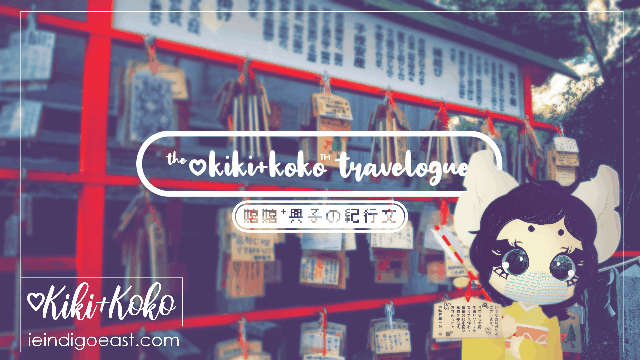 HELLO! I AM QUIZBO™!You may recognise me as the computer robot friend of Kiki and Koko or as the hopefully helpful display and quiz creator for Kiki+Koko: Let’s NihonGO!! lessons. During the creation of this segment, winter is more than officially upon us. The weather is cold, and though I may not experience the same feelings as Earthlings, I feel the struggle of colder temperatures as well. Despite popular misconceptions, computer hardware usually runs best at room temperature. So, I feel as though there may be a chance for some form of empathy for Earthlings during the colder months. But, it truly does not hinder your usage of this corner if you’re reading during winter or summer, because you will most likely encounter today’s bonus vocabulary words at any time of the year. This many bonus vocabulary words in one segment is a rare occasion as perhaps what could be seen as a winter gift. This is a special Word of the Week, indeed. However, what is Word of the Week for someone who may not have experienced it before?
HELLO! I AM QUIZBO™!You may recognise me as the computer robot friend of Kiki and Koko or as the hopefully helpful display and quiz creator for Kiki+Koko: Let’s NihonGO!! lessons. During the creation of this segment, winter is more than officially upon us. The weather is cold, and though I may not experience the same feelings as Earthlings, I feel the struggle of colder temperatures as well. Despite popular misconceptions, computer hardware usually runs best at room temperature. So, I feel as though there may be a chance for some form of empathy for Earthlings during the colder months. But, it truly does not hinder your usage of this corner if you’re reading during winter or summer, because you will most likely encounter today’s bonus vocabulary words at any time of the year. This many bonus vocabulary words in one segment is a rare occasion as perhaps what could be seen as a winter gift. This is a special Word of the Week, indeed. However, what is Word of the Week for someone who may not have experienced it before?
Word of the Week Wednesday fills the gap of time betwixt the lessons and articles regularly posted on Mondays and Fridays, here on Kiki+Koko: Let’s NihonGO!! Online. This segment was created not only to provide more learning opportunities, but as a good reminder to perhaps return to previous lessons and revise / review or maybe even catch up on ones that you happened to miss. Either way, there are many benefits to Word of the Week beyond what may be more obvious.

- If you would like to learn how to apply these words to your own basic sentences, feel free to take a look at a few of Kiki and Koko’s articles on this subject in Kiki+Koko: Let’s NihonGO!! Japanese Language Essentials.
During Word of the Week, you will be introduced to one, or more, Japanese vocabulary words. I am sure to read these aloud for you as not to leave you without a way to use them, sounding them out moji by moji. I will repeat them as many times as you need, or wish to hear. That is part of my function, here. Speaking of giving you a way to use each of the vocabulary words, Kiki and Koko and I work together to create example sentences using the vocabulary given. This can help you with the usage of the word as well as the grammar. These sentences are for flavour, as well, so you do not need to repeat after these. They are at a regular pace which may be difficult. However, you are encouraged to repeat after the vocabulary words themselves as this should assist in learning the word(s).
This segment should be useful for any level of language learner from beginning to perhaps more advanced. You may be introduced to other vocabulary words as a result of reading the sentences as well as discover grammatical structure. This includes the original kanji as well as hiragana and romaji for beginners. Today’s vocabulary words are within the basic gojuuon, so it would be a great opportunity to practise your reading or writing if you are studying to read and write at these stages.
Today, we are also joined by Kiki and Koko with their Helpful Hints that act as an explanation for the Words of the Week. This will prove to be very useful as this concept presented by the bonus vocabulary is not present in English and may take a different perspective to understand.
Without further ado, let us NihonGO!!
Word(s) of the Week:
冬【ふゆ】
fuyu
noun, temporal, adverbial
1. winter
訓読み:ふゆ
音読み:トウ (とう)
Bonus Word(s) of the Week:
寒い【さむい】※
samui
adjective, i adjective
1. cold (as in weather)
2. dull/uninteresting/lame (as in a joke)
Bonus Word(s) of the Week:
冷たい【つめたい】※
tsumetai
adjective, i adjective
1. cold (to the touch)
2. cold (emotionally)
※Helpful Hints with Kiki+Koko
Photo via @kikikokoNihonGO on Twitter
Hello, there!
We’re Kiki and Koko from Kiki+Koko: Let’s NihonGO!! We’re here to help you sort through the new words you’ve been presented, today! So, this may seem simple at first, but we’re here to help you look at this through a new lens that should further your Japanese learning journey, or if you’re simply here to dabble with a few fun words, then we still hope you’ll feel enlightened.
Under the kotatsu, trying to keep warm under blankets whilst trying to write this Word of the Week segment with QUIZBO™, we all definitely agreed that this topic would be apropos. Normally, in English, you simply say, cold, and there may be other implications such as pertaining to health, as in catching cold or flu. However, when it comes to temperature, whilst speaking English, it’s simply one concept whether you’re touching a cold ice lolly or walking out into the blustery snow. But, in Japanese, there are two different concepts and two different words. So, be sure to be careful and use the correct one at the correct time. We’ll help you with some examples… it gets a bit murky.
So, you’re inside. You’re without a heater, and the air is freezing inside. You would definitely say it is 寒い, samui. But, let’s say, it’s morning, you’ve been bundled in blankets, but now, as you crawl out of bed, your feet hit the cold wood floor. As it’s to do with touch, you would say it’s 冷たい, tsumetai. It can be a bit to get used to at first, differentiating between ambient temperature cold and the feel of an object being cold. And, there is a bit of a discrepancy that still follows the rule, but may feel a bit confusing if you’re not quite used to the usage. If you step outside on a snowy blizzard of a day, and the cold wind is whipping. At this point, you’re describing the feel of the wind, in which case, you would call the wind: 冷たい, tsumetai. Again, it may seem a bit difficult, but with time and revision / review, you’ll be certain to get used to it.
Now, when you hear another temperature word in English, you may think of two things as well. And that’s cool. No, literally, that’s the word we’re talking about. The word cool (as in the slang) in Japanese doesn’t exist. Sure, there’s かっこいい, kakkoii, but that really doesn’t work in the way that cool does in English. It’s that someone looks good. Most of the time, if you see something translated as cool from Japanese and it’s the positive slang, then it’s usually going to be another positive word that’s simply trying to be localised into the way people speak. But, we’ll delve into those words in a future lesson. For now, we hope that this at least introduced some new concepts to you or clarified some things as well as opened your eyes to the questionable existence of cool.
We hope that helps!! Until the next lesson!
♡Kiki+Koko
Thank you, Kiki and Koko! Your input is invaluable on this sometimes difficult subject. This is something that you cannot rely on other robots to translate. This differentiation between 寒い and 冷たい can be difficult for computer translators, and some computer robots may even think that when you would rather have the colloquial term for cool, you actually want the temperature, and this will result in a failure in communication. Hopefully, these following sentences will assist you in your further assimilation of these vocabulary words.
Example Sentences:
The first row is in Japanese with Kanji. The Next row is in hiragana, then romanised using rōmaji with the final row translated into English.
(Japanese→Hiragana→Rōmaji→English)
Example #1:
[casual speech]
冬になると 冷たい風と 寒い天気から逃げるに 暖国に旅行したいわ~
冬になると、 つめたいかぜと さむいてんきから にげるに、だんこくにりょこう したいわ。
fuyu ni naru to, tsumetai kaze to samui tenki kara nigeru ni dankoku ni ryokou shitai wa.
When it becomes winter, I want to travel to a warm countries to escape from the cold wind and cold weather.
Example #2:
[emphatic casual speech]
最近、寒くなってるよ。セーターは十分じゃなくて、暖かいコートを 買わなきゃ。
さいきん、さむくなってるよ。せーたーはじゅうぶんじゃなくて、あたたかい こーとを かわなきゃ。
saikin, samuku natteru yo. seetaa wa juubun jyanakute, atatakai kooto wo kawanakya.
It’s been getting cold recently. A jumper isn’t enough, you gotta buy a warm coat.
Example #3:
[casual speech]
絨毯があればよかった。冬中、朝早く起きると、床を踏むとき 超冷たいわ。
じゅうたんが あればよかった。ふゆじゅう、あさはやく おきると、ゆかをふむとき、 ちょうつめたいわ。
jyuutan ga areba yokatta. fuyujyuu, asa hayaku okiru to, yuka wo fumu toki, chou tsumetai wa.
I wish we had a rug. During the winter, if I wake up early in the morning, when I step on the floor, it’s super cold.
That is all for today, but besides the many other lessons available, perhaps, you are interested in another similar Word of the Week topic? I think you may be interested in 🔊Japanese Word(s) of the Week w/ QUIZBO™ | 【季節の移り変わり】+ Bonus:【無常】(+Quick Culture Corner with Kiki+Koko). There is a unique Quick Culture Corner that may introduce you to some cultural topics and traditions. I will be there to present the words and sentences whilst Kiki and Koko break down what could be perceived as a long expression, making it a little simpler to memorise. We hope to see you there!

- Grooving to the content we’re creating? You can leave a TIP in the TIP♡JAR to keep it going!
(Can’t? No worries! The content is free for everyone! We’re just glad you’re here!!!)
Also, be sure to subscribe to our Electronic Mailing List of Tomorrow, today, using the form at the bottom of the web page so you can be the first to see the latest from Kiki+Koko: Let’s NihonGO!!, Indigo East, and SpeRaToBo. And, remember to return back to previous articles and lessons to review/revise.
Also consider following our new page on Twitter to support the spread of this site in a friendly domination of Earth that will help more people. Or, if you are enjoying the content that we are creating, or want to spread this content to more people to be able to access it for free, you can leave a TIP in the TIP♡JAR to keep it going. If you cannot, then no need to worry. We are just super happy that you are here! It is appreciated!
Thank you so much for learning with us!
♡QUIZBO™































5 replies »